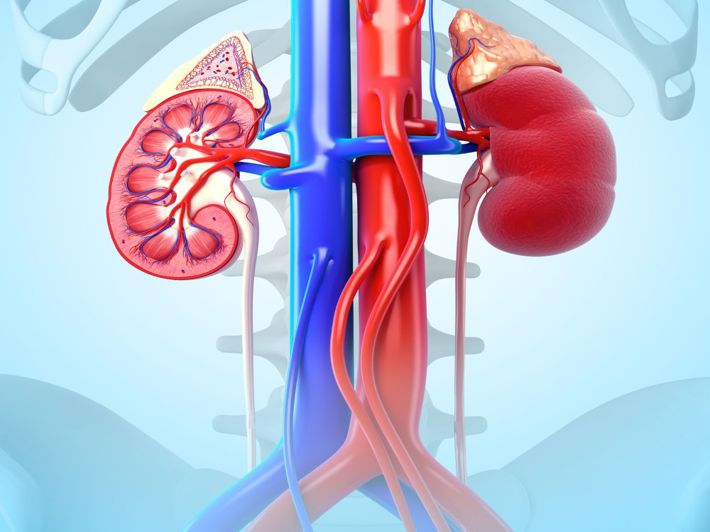Kidney problems begin without clear warning signs in the early stages, and the person may appear completely healthy, but as the damage to the kidneys increases or the kidney disease progresses and approaches kidney failure, the symptoms become more apparent. So what are these symptoms? (1)(2)
Kidney failure symptoms
Symptoms of kidney failure may be similar to the symptoms of other diseases, and their appearance does not necessarily indicate kidney failure, so it is necessary to consult a doctor to obtain the necessary invistigations for diagnosis and develop an appropriate treatment plan.
The following are possible signs that may indicate that you are suffering from kidney failure: (1)(2)
1-Changes in urine
Kidney dysfunction may lead to changes in the color or nature of urine, including: (3)
- Foamy urine, due to the presence of a large amount of protein in the urine (urine albumin).
- Brown or pale urine, or the presence of blood in the urine (hematuria).
- Difficulty urinating (Dysuria).
- Frequent urination, especially at night (nocturnal urinary frequency). (4)
2-Extreme fatigue and difficulty concentrating
You can feel extreme fatigue, lack of energy, dizziness, difficulty concentrating, and memory problems as a result of decreased kidney function due to two main mechanisms: (3)(5)
- Toxins and impurities accumulate in the blood, as a result of the kidneys’ inability to purify them effectively.
- The production of an important hormone made by the kidneys to stimulate the body to produce red blood cells decreases, leading to anemia and the accompanying symptoms of fatigue and exhaustion.
3-Swelling of the body
The inability of the kidneys to remove excess fluids and salts from the body may lead to swelling of the body, especially in the hands, feet, ankles, legs, face, or around the eyes. (4)(6)
4-Vomiting, nausea, and loss of appetite
A severe buildup of waste in the blood can lead to nausea, vomiting, or stomach upset. This may leave you with little desire to eat, whether because you feel full, feel too sick, or tired when you eat. This may lead to weight loss. (3)(6)
5-Muscle spasms
Cramps in your legs and elsewhere can be a sign of poor kidney function and caused by an imbalance in your levels of sodium, calcium, potassium, or other electrolytes, which affects how your muscles and nerves work. (3)
6-Dry or itchy skin
Dry and itchy skin may occur when waste products and toxins build up in the blood, and the kidneys are no longer able to maintain the correct balance of minerals and nutrients in the blood. (3)
7-Metallic taste and foul breath
The buildup of waste products in the blood can make food taste different and cause bad breath. (3)(5)
8-Difficulty breathing
You can have difficulty breathing due to excess fluid accumulating in your lungs when your kidneys don't remove enough fluid, or due to anemia caused by kidney problems. (6)
9-Sleep problems
Kidney problems can lead to interrupted and uncomfortable sleep, due to the following: (7)(8)
- Restless legs syndrome, which is characterized by an uncontrolled urge to move the legs, especially at night.
- Sleep apnea, a condition in which breathing stops and starts repeatedly during sleep.
- Increased need to urinate during the night (nocturnal polyuria).
- Itching.
- Stress and anxiety.
- Muscle spasms.
10-Bilateral lower back pain
You may feel local pain near your kidneys, characterized by that its intensity does not change with movement or stretching. (6)
11-Hypertension
Fluid and excess sodium buildup as a result of kidney disease can cause hypertension. (6)
How does kidney failure occur?
Kidney failure means that 85-90% of your kidney function has stopped and not working properly to keep you alive, to the point of requiring dialysis or a kidney transplant. (10)(11)
This can happen in one of two ways: (1)
- Temporary or acute kidney failure occurs suddenly within days for reasons such as: severe dehydration, some medications, and direct kidney injury.
- Chronic kidney failure: Poor kidney function gradually develops over years, due to diseases such as: diabetes, hypertension, and lupus.
How do I know if my kidneys are in danger?
Since the symptoms may be unnoticeable or obvious at times, and only appear in serious stages of kidney damage, the only way to be sure about the health of the kidneys is to perform periodic kidney function tests, especially if you suffer from chronic kidney disease, or are at high risk due to hypertension, diabetes, a family history of kidney failure, or if you are older than 60 years. (4)
Don't hesitate to get the medical help you need now! Book an appointment with an elite group of specialists at the Nephrology and Urology Clinic at Al-Ahli Hospital, and let our experts evaluate your condition and provide you with the optimal solutions to your health problems.
References:
- https://my.clevelandclinic.org/health/diseases/17689-kidney-failure
- https://stanfordhealthcare.org/medical-conditions/liver-kidneys-and-urinary-system/kidney-failure/symptoms.html
- https://www.webmd.com/a-to-z-guides/ss/slideshow-kidney-warning-signs
- https://www.kidney.org/news/ekidney/august14/10_Signs_You_May_Have_Kidney_Disease
- https://lifeoptions.org/learn-about-kidney-disease/kidney-disease-symptoms/
- https://www.freseniuskidneycare.com/kidney-disease/ckd/symptoms
- https://www.kidneymedicinejournal.org/article/S2590-0595(22)00071-1/fulltext
- https://www.davita.com/education/ckd-life/lifestyle-changes/sleep-issues-and-chronic-kidney-disease
- https://www.mayoclinic.org/diseases-conditions/kidney-failure/diagnosis-treatment/drc-20369053
- https://www.kidney.org/atoz/content/KidneyFailure
- https://www.urologyhealth.org/urology-a-z/k/kidney-(renal)-failure






